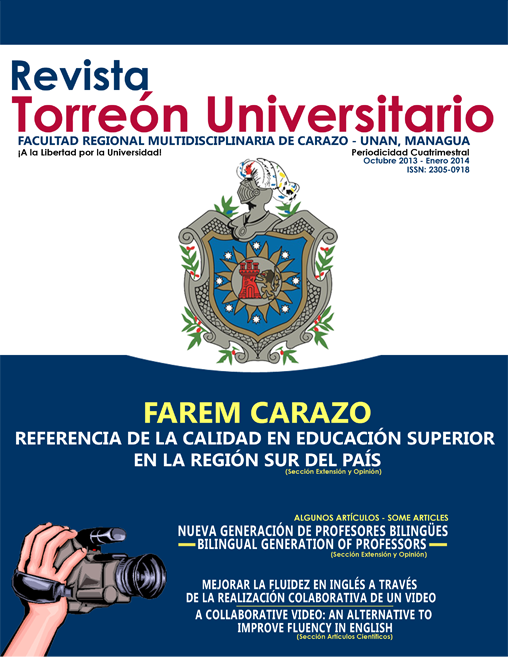ICT training plan for new teachers of the Teaching Department of Sciences, Technology and Health of the FAREM-Carazo, UNAN-Managua
Keywords:
University teacher training, ICT, Novice teachers, Innovation, ImprovementAbstract
The present work, it is the result of the implementation of a plan of ICT training for novice teachers of the Department of Sciences technologies and health FAREM-CARAZO, during the first half of the year 2013, was developed from a diagnostics institutional that shows the need for training in ICT for teachers and students, this necessitated the elaboration of a general plan training program, for its implementation, then up to obtaining results and suggestions for improvement. The usefulness of the project lies in the FAREM-Carazo, can have a training program on novel ICT for teachers, that a principle and for reasons of this study was applied to the Department of Sciences technologies and health, but that its usefulness can be extended to the other department´s teachers.
Downloads
References
Ausubel, D.P; Novak, J. D. y Hanesian, H. Psicología Educativa: Un punto de vista cognoscitivo. 1983.
Aufderheide, P. y Firestone, C. M. (1993). La Competencia Digital de los Estudiantes Universitarios: La Cuestión Universitaria. Recuperado el 2013 febrero 11 de http://www.lacuestionuniversitaria.upm.es/web/articulo.php?id_articulo=83
Castañeda, G. M. (2011). El Docente Extraordinaria, Competencias Docentes. Merida, Yucatan. Mexico: Descubriendo.
Cruz, Erick., Mendieta, Concepción., Conrado, Pedro, (2011). Instrumentos Para el
Análisis de la Selección y Priorización de las Necesidades Encontradas. Jinotepe, Carazo.
Gairín, Joaquín y Sánchez, Primitivo (2008). Planificar la Formación en el Espacio Europeo de la Educación Superior. Madrid: ICE de la UCM.
González V y González R.M. (2008) Competencias genéricas y formación profesional: un análisis desde la docencia universitaria. Revista Iberoamericana, Recuperado el 12 de febrero del 2013 de http://www.rieoei.org/rie47a09.htm.
González Vargas (2012) las Competencias Digitales de los docentes del SXXI. Recuperado el 20 de febrero del 2013 de http://pedablogia.wordpress.com/2012/06/15/las-competencias-digitales-de-los-docentes-del-siglo-xxi/.
Pinya C. (2008). La formación permanente del profesorado universitario: estado de la cuestión. IN. Revista Electrònica d’Investigació i Innovació Educativa i Socioeducativa, V. 1, n. 0, PAGINES 3-24. Consultado en http://www.in.uib.cat/pags/volumenes/vol1_num0/
carme/index.html en 3 de marzo del 2013
Salinas, J. (2004). Revista Universidad y Sociedad del Conocimiento. Recuperado el 15 de Febrero de 2013, de www.uoc.edu/rusc
Tomas, Marian., Armengol, Carme., Borrell, Núria., Castro, Diego., Feixas, Mónica., Gairín, Joaquín, (2011). Cuestionario de Identificación de la Cultura Organizativa, Adaptado Para Nicaragua. Jinotepe, Carazo-Nicaragua.
Toro y Ochoa y otros (2002), Competencias deseables de un docente universitario en el uso de las tecnologías de información y comunicación (TIC).Primer Congreso Internacional Mediado con tecnologías Recuperado el 15 de Febrero de 2013 de www.colombiaaprende.edu.co/html/.../1607/articles-74000_archivo.pdf
UNAN-MANAGUA. (2011). Modelo Educativo, Normativa y Metodologia para Planificacion Curricular 2011. Managua: Unan-Managua.
Zabalza, M. A. (2004). La enseñanza universitaria. El escenario y sus protagonistas (1ª ed.). Madrid: Narcea S.A.
Downloads
Published
Issue
Section
License
Copyright (c) 2013 National Autonomous University of Nicaragua, Managua

This work is licensed under a Creative Commons Attribution-NonCommercial-NoDerivatives 4.0 International License.
The authors who publish in this journal agree to the following terms.
- The author or authors of the articles, essays or research grant the National Autonomous University of Nicaragua, Managua (UNAN-Managua) the editing rights (copyright) of the submitted work, therefore the University has the exclusive right to publish the article for the entire copyright period.
- These copyrights/authors authorize Torreón Universitario Magazine and the University to edit and disseminate/publish the article in said Magazine, including printed and electronic reproduction, storage, retrieval and any other type of publication, and sources of secondary information as services. of summaries and databases, they also empower it to protect the article against unauthorized use for dissemination by printed or electronic media (PDF, HTML, EPUB, XML or others).
License for use of content
The magazine uses the Creative Commons Attribution-NonCommercial-NoDerivs 4.0 International License.
Under this statement:

This journal is licensed under a Creative Commons Attribution-NonCommercial-NoDerivatives 4.0 International License. It can be copied, distributed and transmitted publicly as long as the author and source are cited (Revista Torreón Universitario), it should not be modified or used for any commercial purpose. The full license can be found at http://creativecommons.org/licenses/by-nc-nd/4.0/.



